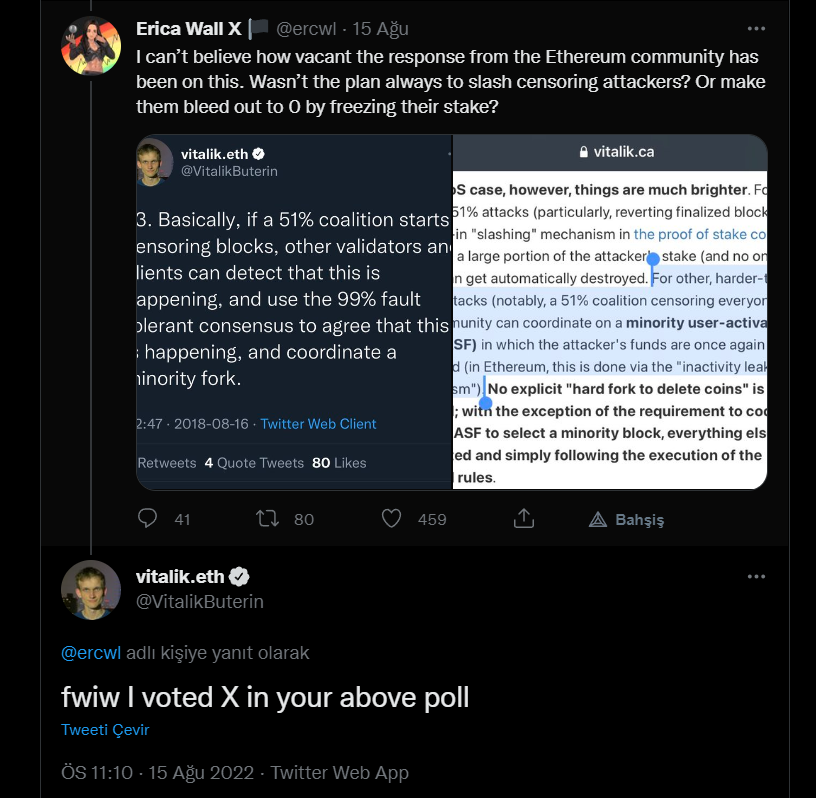The recent Foreign Assets Control Office (OFAC) intervention on Tornado wallets has raised several concerns in the cryptocurrency community. At the top of these concerns is whether the network can be blocked by states after the Ethereum Merge update.
In the past weeks, US authorities have completely blocked the use of Tornado Cash across the country as a result of the steps they have taken to combat cryptocurrency laundering. Suspicious addresses they froze, one in Amsterdam Tornado Cash developer arrested and the decentralized mood of cryptocurrencies a heavy fog descended. Following the developments, OFAC, which carries out its activities within the scope of the US Treasury Department, August 9 believed to have laundered money through Tornado, together with Tornado Cash. 40 Ethereum your address too sanctions list reported that he received it. All of these encumbrances make it the second most voluminous stablecoin. USDC‘s developer company Circle supported and implemented by
All of these Ethereum Merge update and Proof of Stake The fact that it is implemented about a month before the transition to the (Proof of Stake) system also increases the concern about what may happen after the update in question.
The issue that has been discussed by the community in recent days is that after this big update to Ethereum, the rate that represents the majority. of validators (verifiers) Discusses the possibility of starting to block risky addresses linked to Tornado bans. validators, OFACEven if it is subject to some other censorship laws that will be demanded by .
In the early stages of Ethereum 2.0, many exchanges offered Ether staking services, and users can use these centralized exchanges. up to 2 years they locked their Ethereum in the process. At this point, the current Ethereum network validators 33%More than 1,000 of them are located on centralized exchanges likely to comply with OPAC rules. we know. What about centralized exchanges? the entire independent structure of the network can they take it away? Is there anything decentralized users can do about it?
First of all, these exchanges, which have more than 33% Ethereum validator power, do not all act in line with the law restrictions of the OPAC, which is good news for the decentralized nature of this network. Coinbase CEO on this Brian Armstrong Transactions made on the Ethereum blockchain stating that they will not be willing to censor made statements. According to this statement, one of the options in question is that of all exchanges. remove staking and it may thus be that OFAC falls outside the bounds of the law. In another option, users can withdraw their Ethereum on the stock market with their own consciousness and to cold wallets or to the nodes they set up transfers will occur. But in order for them to withdraw their Ethereum staked on these centralized exchanges, they first came after the Merge update. Shanghai update needs to be activated. There is a case of remaining Ethereums on centralized exchanges until Shanghai happens, which is about Around 40 million Ether means it will remain locked for an indefinite period.
So can Ethereum really be censored? The answer is not as simple as “yes” or “no”
In fact, the whole thing seems to be related to the attitudes and attitudes of network validators, or in other words, the way they prefer. Recently, a Twitter user made a comment about the preference. started voting. This question posed to the Ethereum community has two options:
X) Consider censorship an attack on Ethereum and burn the assets of the censors through social consensus. (slash)
Y) Accept censorship
According to the voting result, which was attended by a total of 10 thousand people, including the founder of Ethereum, Vitalik. 60%More than 1% prefer the slashing option. The comment by the founder Buterin under the said vote also shows that he is on the 60% side, and no submission to censorship reminds me once again.

What is Slash?
What is Slashing? If any validator on the Ethereum network does not place transfers in blocks and at this point deliberately tries to include false transfersthe validator in question is penalized and If necessary, the 32 ETH in his hand will be completely burned.. This is called the slash mechanism. The validator that validates the block in the system is followed by other validators in the system. When a validator adds a block, 1/32 of the system is drawn randomly and the block is checked by the others.
But regardless, applications built on Ethereum with VC funds and End users who always prioritize their profit margin There is also a serious possibility that they will choose a legal PoS (Proof of Stake) network. At this point Including Legal Ethereum and Illigel Ethereum network two different split networks/communities may appear.
While in a fair network operation, the slash system can have a deterrent effect on the validators, in the other case, if more than 51% of the staked ether falls into the hands of the party that accepts the censorship and wants to protect their money with the guarantee of the state, there is only one option left: Forking the Ethereum network. In other words, we can think of it as switching to a new blockchain and leaving the currently working Ethereum system to the censors and gaining full control over the new Ethereum. Many Ethereum developers, including Vitalik, are known to fully support the fork event in the event of a 51% loss of power.
Is it all just an unnecessary policy of spreading fear?
After the tornado incident an anonymous user Via Tornado Cash despite all bans To Ethereum addresses of famous names of the USA It is known to send ether over Tornado. The “playful” act is essentially a violation of the laws and rules enforced by the United States. being clumsily defined and therefore is difficult to implement in practice. proves it. I think that the same enforcement challenge will emerge as a bottomless ocean for policy makers to contend with when trying to interfere with the Ethereum network in the future.
Besides, we know that until now, no statement has been made by the validators that they will actually censor transactions. It is also not yet clear whether governments will even want to enforce this censorship.
Whatever happensOFAC tries censorship or not, The only and ultimate way to ensure security on the Ethereum network it lies in the fact that users take the responsibility individually. For every cryptocurrency user who dreams of a decentralized and freer world for their future, so to speak “the debt of loyalty“To pay, it will be enough to set up a simple NODE on the network. Technically, this system can be run with 16 MBit internet and 1 TB SSD.is the only option for the user to support the network with full security control without being dependent on either Metamask, Ledger or any other brokerage.
If this is successful, no one, no government, no institution or organization will not censor this technology and this technology in the long run will accept and adapt..
